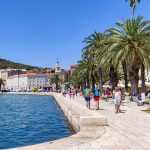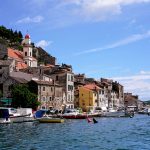October 28, 2019 – While many Croats are emigrating to Ireland, some are headed in the opposite direction. Jason Berry, an Irishman living in Split for 6 years offers some excellent emigration food for thought.
There were some interesting reactions to our article at the weekend interviewing a Croatian expat approaching 5 years living in Ireland after her decision to move from Croatia. You can read Lidija’s experiences in Kinsale in Is the Grass Greener in Ireland? A Croatian Expat View After 5 Years Abroad. One of the first messages I received was from Maura from the United States:
Thank you for a delightful, honest appraisal of life in Kinsale. My parents immigrated to America in 1929. I have an Irish Passport and have been there only once. Beautiful land and people. So happy it’s home to many now and can provide jobs, that’s why my parents also left the old country for the New life. Blessings and love, Maura.
A nice message, and Lidija and Maura are now in touch, but it got me wondering – with all the emigration from Slavonia right now, could it be possible that we could see a similar immigration from a totally different country 90 years from now, with people coming for the very thing that is so hard to find right now – employment?
Even more interesting was an email I received yesterday from Jason Berry, an American-Irishman who has been living in Split for the last six years. Although I have never met Jason, we did feature his successful career in Dalmatia in our foreign entrepreneurs in Croatia feature.
Jason offered a rather different perspective on the moving to Ireland discussion, and well worth a read for those considering the move. Plenty of pros and cons to contemplate. His article below is a version that originally appeared in Croatian in Dalmatinski Portal.
Over to Jason Berry…
So you are thinking about going to Ireland, the island of opportunity, where beer, jobs and money are everywhere. Here is what you need to know. I’m going to share with you what life is really like in Ireland when compared to life in Croatia.
Ireland and Croatia are remarkably similar. Approximately 4.5 million people in both countries, Catholic, and people in both countries speak excellent English. Both countries have very large diasporas and Ireland is one of only a few countries where Croats can immediately go to and work within the EU, no questions asked. Thank you European Union.
The weather. According to the website www.currentresults.com Split gets an average of around 2600 hours of sunshine a year, and most of Dalmacija gets the same. Zagreb and Slavonia get around 1900 hours per year. Nice! Dublin gets 1400. Not so nice. It takes a lot of rain to make Ireland so green. It’s even rainier in the west of Ireland. If you are going to Ireland prepare for a lot less sunshine, shorter days, more darkness, and more grey in the winter. Ironically both countries get about the same rainfall, around 1000 mm, the difference is that Ireland gets a little each day, where in Croatia we have thunderous downpours where you can’t go outside because it is raining so hard. But don’t be fooled, plenty of places in Ireland get 2000mm per year. Bring an umbrella.
If you like swimming in the sea, bring a wetsuit to Ireland. Ireland sea temperatures rarely get higher than 17C. You’ll be coming back to Croatia for your summer holidays and tickets home aren’t cheap during the season unless you book far ahead. I’ve paid between 300-700 euro with an average of around 400-500 for round trip tickets. Off season it gets better, and flights on Ryanair and Aerlingus to Zagreb and Zadar help, but Split and Dubrovnik are pricey. Outside of the season there are no direct flights.
Ireland was ranked in or near the top 10 countries in the world for ease of business by the world bank, Croatia 51. It is much easier to do business in Ireland, less red tape, goodbye notaries, good bye uhlebs that get in your way, and peace of mind that officials aren’t trying to find some little problem with your business and fine you. Corporate tax in Ireland is 12.5% vs 20% in Croatia. 20% is pretty good by the way.
But let’s get down to business, the real reason everybody wants to go to Ireland is jobs. So let’s take a look at what it’s like in Ireland on the job front. Unemployment is at an all-time low in Ireland and salaries are on the increase. So how do you make the “big money” in Ireland. Couple of notes on that. In Ireland when discussing salaries, the Irish talk about salaries before tax. If somebody says they are making 30,000 euro per year, that is before tax. Income tax rates are a lot better though in Ireland than Croatia and big taxes don’t hit til after you are making 30K or so. Here’s a link to a tax calculator. https://salaryaftertax.com/ie But don’t get me wrong, by and large salaries are higher and job selection is better.
There are a lot more professional career type jobs in IT, finance, and other 21st century careers, but you need to be qualified. These types of professional jobs are where the real opportunities are for Croats going to Ireland. Expect to get a low paying first professional job and then make more in your next jobs. But if you are going for a restaurant job, service sector, retail, or most manual labor jobs, income levels aren’t hugely different once you account for higher costs of living in Ireland which brings me to my next point. You might earn more in Ireland, but you pay more for everything except rain (that’s included).
Your biggest expense coming to Ireland will be rent. In Dublin average rent is 1875 a month. Those are euros by the way not kune. http://www.thejournal.ie/daft-rental-report-2-3992744-May2018/ Check out Daft.ie to get an idea of what is out there on the rental market. Good news, unlike Croatia, in Ireland, the renter doesn’t have to pay the estate agent for finding them a place. In Ireland only the landlord pays one month’s rent to the agent.
As a Croat your second biggest expense will be coffee, probably. Gone will be your days of 8-10 kn coffees a few times a day. In Ireland, take-away coffee will cost you around 2-4 Euro. If you want a croissant, tack on another 2-4 Euro. And if like me you love a good narancada after the coffee, OJ will set you back 4-6 euro. And if you want a coffee inside at a restaurant or café, its even more expensive. So if you start your day like me with a coffee, a croissant, and some OJ, you will have no change from 10 Euro. If you drink 3 cups of coffee a day, you’ll be spending around 15 euro a day or 450 euro a month. Prepare to learn how to make coffee, get a big high paying job, or curb that kava addiction.
If you have a smoking problem, your problem just got much bigger. A pack of cigarettes is 10-15 euro. https://www.expatistan.com/cost-of-living/dublin. If you smoke a pack a day, here’s another 300-450 euro a month.
For the ladies, haircuts, blow-drying your hair, pedicure and manicure, you’ll need to take out a few loans. Haircuts are 60-100 euro. Blow dries are 30 euro. Manicures will run you 30-50 euro. I’m sure you can find cheaper, but you’ll struggle in Dublin city centre. For dudes, count on around 15-25 euro for a haircut. https://www.treatwell.ie/places/treatment-haircuts-and-hairdressing/offer-type-local/in-dublin-ireland/
On average Dublin is 90% more expensive than Split and Zagreb. If you want to get an equal paying job in Ireland, it needs to pay at least twice as much as in Croatia. If you earn 1,000 euro a month in Croatia, you want to be earning well above 2.5K in Ireland, that means a job that pays around 45K euro in Irish terms. You’ll have to be creative to save money and live a similar standard under that number.
If I had to go back to Ireland tomorrow the things I would miss immediately are: no fresh fruits and veggies from my friends and family. No homemade olive oil from my punac. No burek. Sunshine. Coffee culture and cheap good coffee and chats (people generally get coffee to go, so no more lingering around the kafic). Skampi na buzaru. No vineyards and good wine everywhere. The sea. Teleca Peka. Sunshine. Fresh fruit and vegetables all year round. Basketball is everywhere. Croatian international football. Our nanny. Life is in general very inexpensive and good value in Croatia. Going to the beach for 6 months of the year and of course the network of friends and family that look after me and my family. And sunshine. Do not underestimate how powerful good weather is on your well-being.
So for those of you considering a life in Ireland only for financial purposes, its not an easy decision. You’ll be living in a new country, enjoying the experience, meeting new people, but you probably won’t be saving much or sending money home. In exchange for living in Ireland, you give up sunshine, being close to family, burek and cevapcici. Ireland is a great place, but make sure you do your research on the financials of your job and everyday expenses, know what you are getting into. It’s not all a pot of gold at the end of an Irish rainbow.
Thanks Jason, very interesting.
Have you emigrated to Ireland or another country in the last few years and would like to share your experiences, positive and negative? Contact us on news@total-croatia-news.com Subject Greener Grass.
For more news about the Croatian diaspora, follow the dedicated TCN section.










